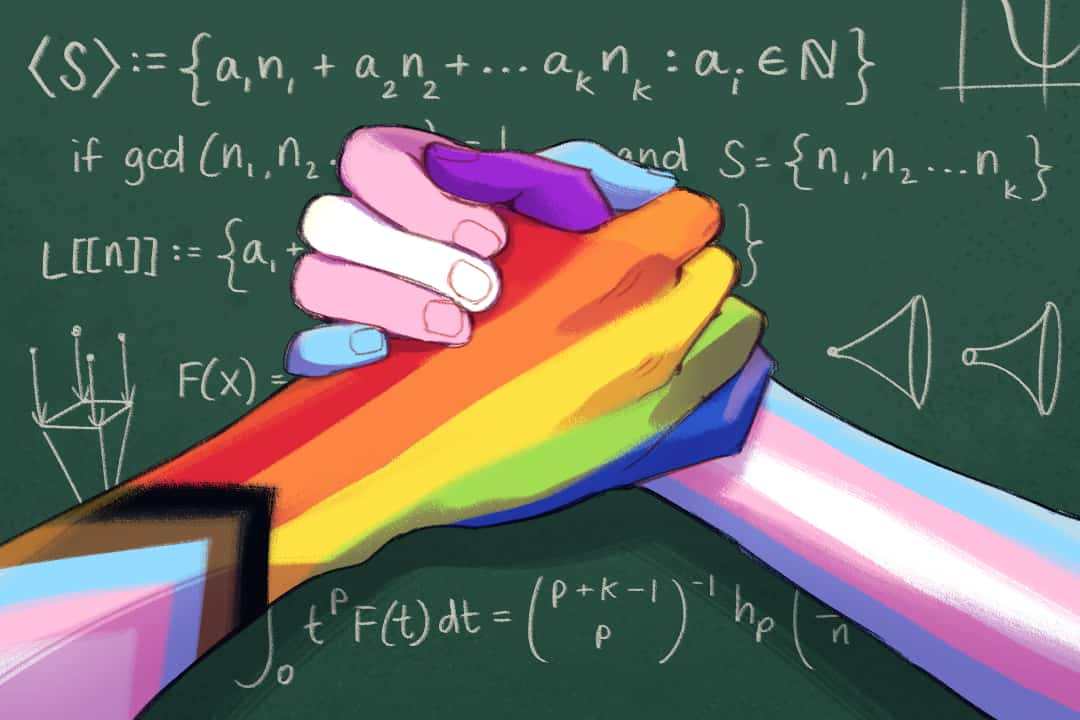On November 18, the Fields Institute hosted its second LGBTQ+ Math Day, a one-day online conference featuring LGBTQ+ people in mathematics.
The Fields Institute is a mathematical research organization located at the University of Toronto. Deirdre Haskell, deputy director of the Fields Institute, told The Varsity that the institute organizes events to spotlight LGBTQ+ researchers in math, since equity-building conferences are vital to the mathematics community.
“I think it’s really important that we can support inclusion in mathematics — mathematics should be available for everybody to do,” said Haskell. “It’s really important to me personally to make it possible for people to feel safe about doing mathematics.”
What do LGBTQ+ mathematicians research?
The main part of the event consisted of talks from four speakers — Mohamed Omar, Becca Thomases, Seppo Niemi-Colvin, and Amanda Folsom — from various fields of mathematics. Each of their half-hour talks focused on a particular topic from their research.
Omar, an associate professor of mathematics at Harvey Mudd College, started the first lecture with a simple, easily accessible concept — how many ways can you combine different sizes of chicken nugget orders? It turns out that, using only six-piece, nine-piece, and 12-piece chicken nuggets, you can get an order with exactly as many chicken nuggets as you’d like, as long as you’re willing to eat at least 44 of them.
He then used that intuitive idea of chicken nugget orders to talk about generating numbers from arbitrary generating sets in similar ways. He and his colleagues study numerical semigroups — the numbers that are generated by those sets — and the different features they exhibit, which display properties that turn out to be very similar to the geometric properties of certain algebraic curves.
Toward the end of his presentation, Omar pivoted to talk about how his relationship with mathematics had changed over his educational career. During high school, he often used math as a fun escape from stressful experiences in his personal life. “I had a really, really tumultuous coming out process, and for me, math provided this opportunity to dive deeply into interesting, fascinating problems in a land that wasn’t attacking me.”
Once he got to university, he found community and support in The Glow Centre, an organization at the University of Waterloo designed to serve queer and trans students. “My experiences through The Glow Centre made a massive difference in me being able to get through university in one mentally well piece,” he said. That support helped him engage with mathematics alongside his personal and professional life.
Similarly, the other lecturers each focused the majority of their time on a specific research topic, and some of them also talked about their personal experiences as LGBTQ+ people in STEM. Thomases talked about novel fluid dynamics research that modelled how microscopic creatures with flagella could swim through viscous, non-Newtonian fluids — in other words, as she put it, “How [they] swim through goo.” Niemi-Colvin talked about how taking the difference between two different topological measures of shape can help mathematicians find significantly complex and novel information — eventually tying it back to the theme of the day by pointing out the complexity of how gender interacts with other societal institutions. Folsom talked about mathematical explanations for and definitions of symmetry and the ways in which it’s traditionally associated with beauty.
Between lectures, speakers and organizers held short ‘coffee breaks’ in breakout rooms to simulate the experience of chatting at conferences. During these breaks, speakers and participants had the chance to catch up, talk about plans for future conferences, and carry on discussions about how to make events like these — and the world of mathematics in general — more accessible to all participants.
All of the lectures have been posted online on the Fields Institute’s YouTube channel.
An ongoing discussion
The second part of the event consisted of a panel discussion on the experiences of being LGBTQ+ in mathematics research. Where the first portion of the event focused heavily on participants’ research, this discussion focused much more heavily on personal experience.
The panel was moderated by Evelyn Lamb, a science and mathematics journalist and co-host of the podcast My Favourite Theorem. She led panellists Catherine Cannizzo and Andrés Vindas Meléndez — both of them postgraduate mathematics researchers — in a discussion about their own experiences in the mathematics community, their experiences of being LGBTQ+ in academia, and ways of improving the academic culture for other LGBTQ+ mathematicians.
Meléndez talked about his experiences during undergraduate and graduate school where he felt isolated because of the casual homophobic language his peers would throw around. At one point, when he tried to bring up his concerns to the institutions where he was studying, he felt like the university tried to placate him instead of actually talking to the students who were acting badly.
Today, he’s found ways to be more comfortable in his environment by learning about the LGBTQ+ community in the places he lives and being open about his identity in places where it’s safe to do so. “I try to be as open as I can, because I want a full mathematical experience with my full authentic self,” he said. He tries especially to be open with the students he advises, so that he can make a space where they feel comfortable being themselves and educating him on their own identities.
Cannizzo talked about her experiences discovering her identity and coming out in the middle of graduate school. She found herself in an environment that was supportive of her identity and her coming-out process, but she struggled with complicated feelings about her identity.
Coming out and making sense of her own identity, she said, really helped her get back to a place where she had an easier time engaging the creativity necessary for a mathematics career. “To do math, you have to be in a space where you can be yourself.”


